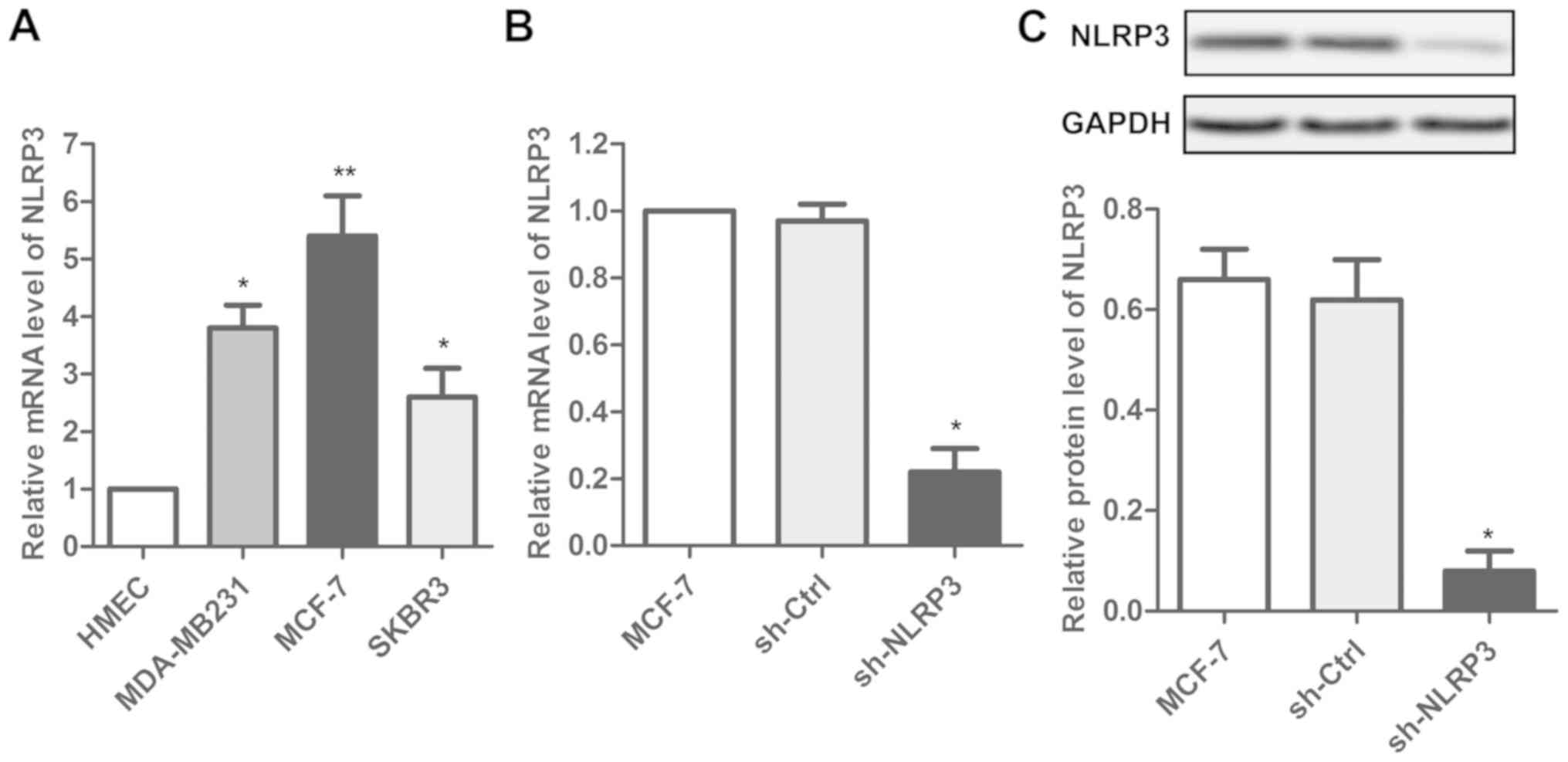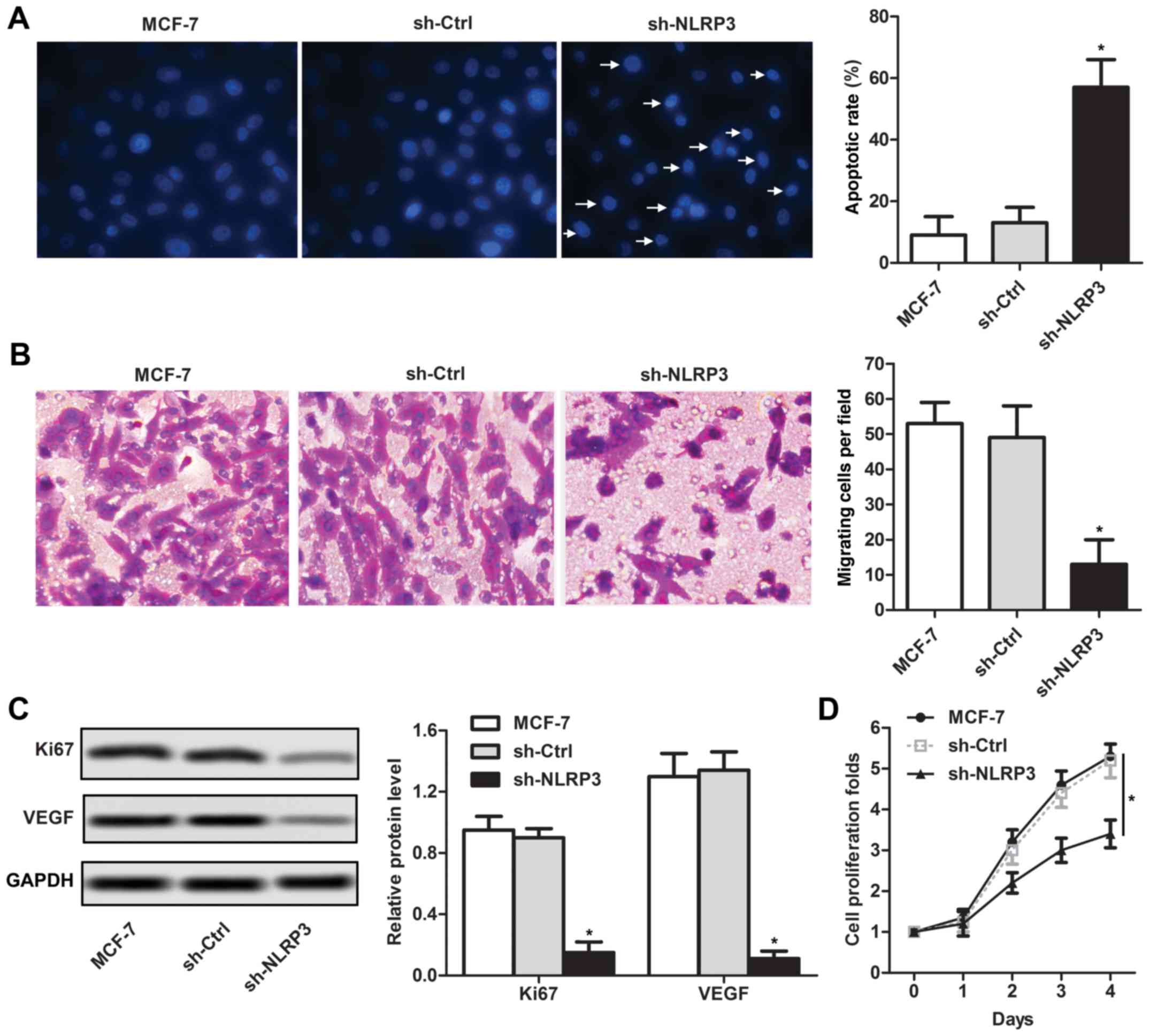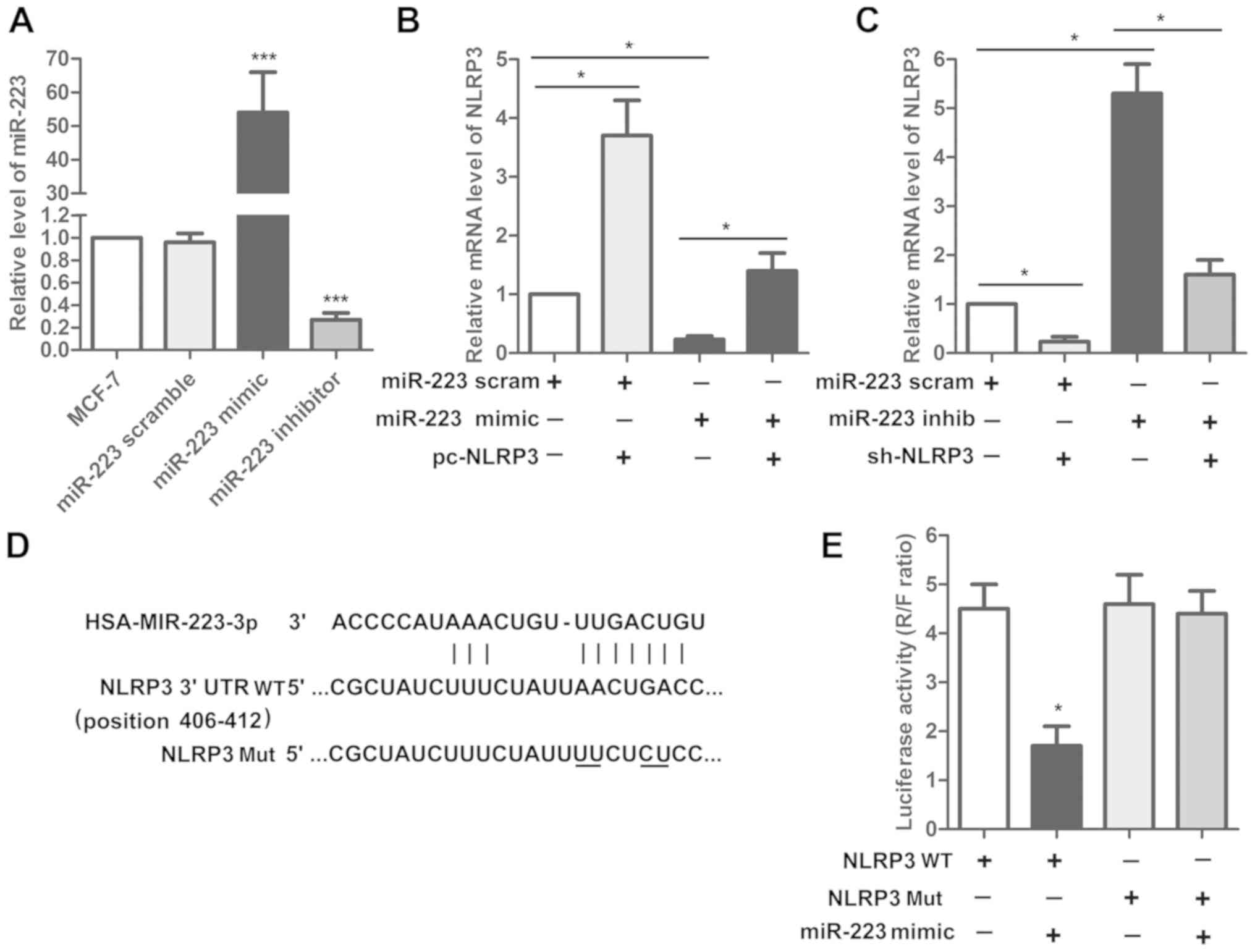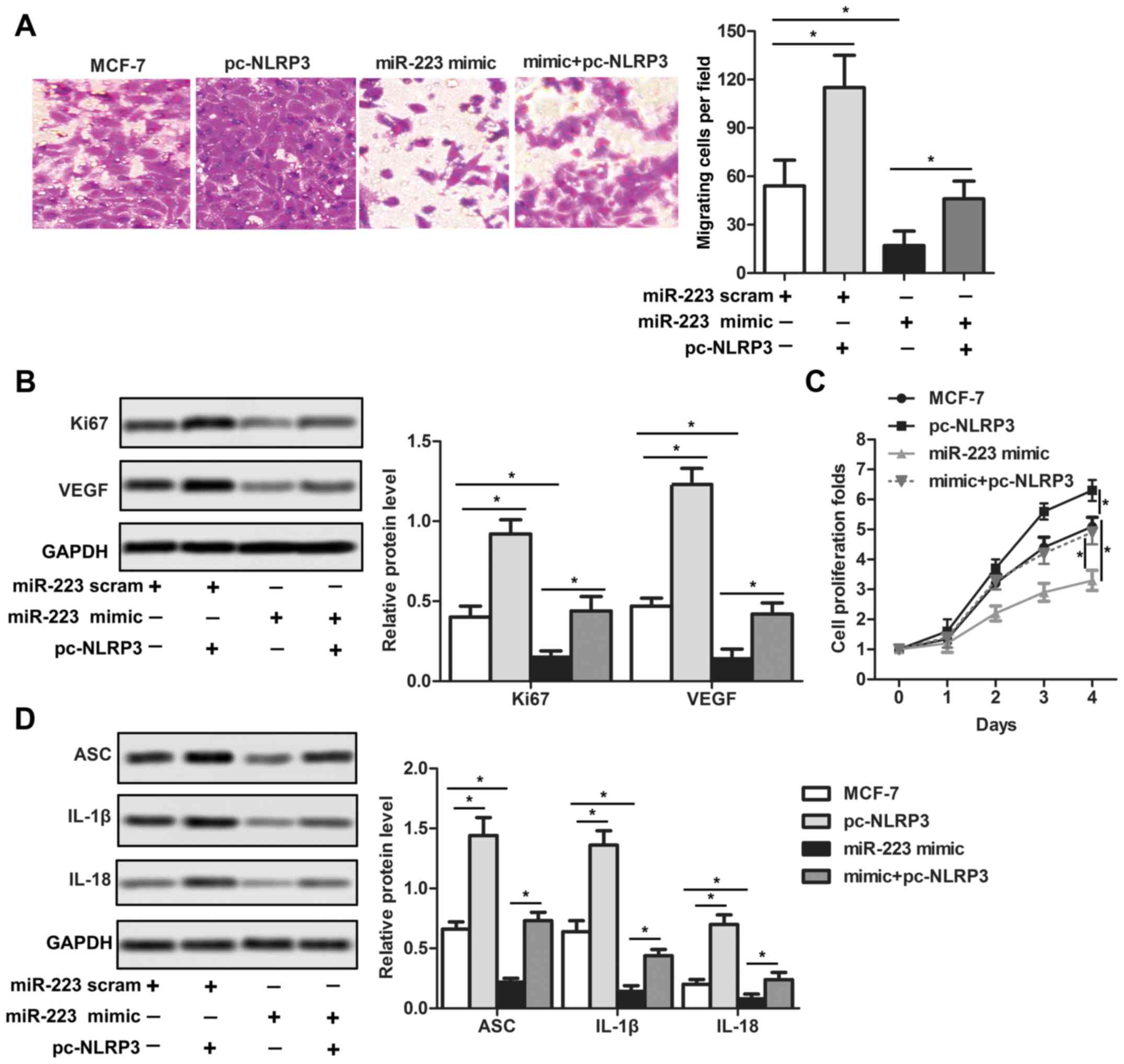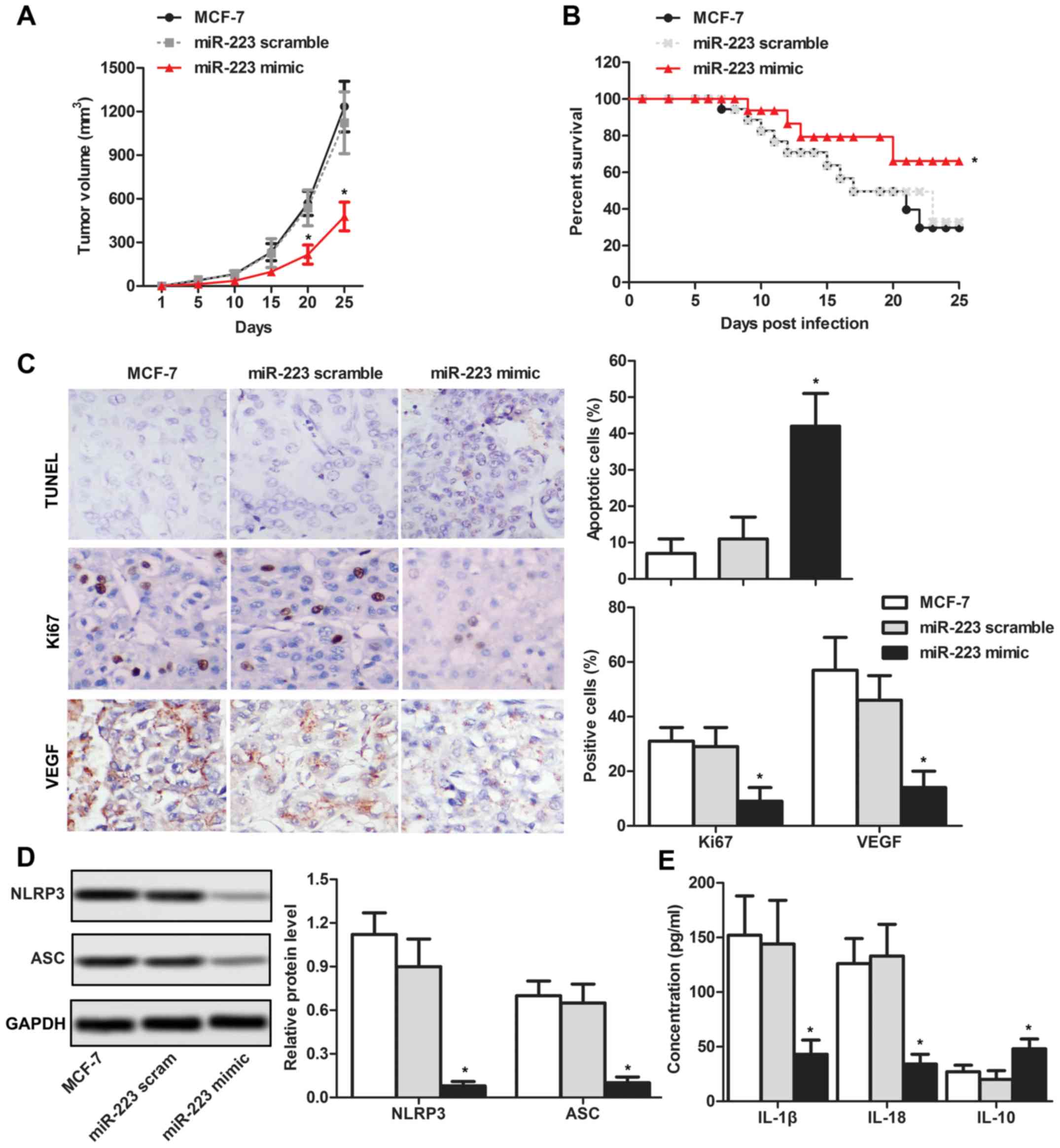|
1
|
Sun Q, Liu T, Yuan Y, Guo Z, Xie G, Du S,
Lin X, Xu Z, Liu M, Wang W, et al: MiR-200c inhibits autophagy and
enhances radiosensitivity in breast cancer cells by targeting
UBQLN1. Int J Cancer. 136:1003–1012. 2015. View Article : Google Scholar : PubMed/NCBI
|
|
2
|
Darby S, McGale P, Correa C, Taylor C,
Arriagada R, Clarke M, Cutter D, Davies C, Ewertz M, Godwin J, et
al: Effect of radiotherapy after breast-conserving surgery on
10-year recurrence and 15-year breast cancer death: Meta-analysis
of individual patient data for 10,801 women in 17 randomised
trials. Lancet. 378:1707–1716. 2011. View Article : Google Scholar : PubMed/NCBI
|
|
3
|
Deng L, Lei Q, Wang Y, Wang Z, Xie G,
Zhong X, Wang Y, Chen N, Qiu Y, Pu T, et al: Downregulation of
miR-221-3p and upregulation of its target gene PARP1 are prognostic
biomarkers for triple negative breast cancer patients and
associated with poor prognosis. Oncotarget. 8:108712–108725. 2017.
View Article : Google Scholar : PubMed/NCBI
|
|
4
|
Terme M, Ullrich E, Aymeric L, Meinhardt
K, Desbois M, Delahaye N, Viaud S, Ryffel B, Yagita H, Kaplanski G,
et al: IL-18 induces PD-1-dependent immunosuppression in cancer.
Cancer Res. 71:5393–5399. 2011. View Article : Google Scholar : PubMed/NCBI
|
|
5
|
Fan H, Zhao G, Liu L, Liu F, Gong W, Liu
X, Yang L, Wang J and Hou Y: Pre-treatment with IL-1β enhances the
efficacy of MSC transplantation in DSS-induced colitis. Cell Mol
Immunol. 9:473–481. 2012. View Article : Google Scholar : PubMed/NCBI
|
|
6
|
Zhao X, Zhang C, Hua M, Wang R, Zhong C,
Yu J, Han F, He N, Zhao Y, Liu G, et al: NLRP3 inflammasome
activation plays a carcinogenic role through effector cytokine
IL-18 in lymphoma. Oncotarget. 8:108571–108583. 2017.PubMed/NCBI
|
|
7
|
Martinon F, Burns K and Tschopp J: The
inflammasome: A molecular platform triggering activation of
inflammatory caspases and processing of proIL-beta. Mol Cell.
10:417–426. 2002. View Article : Google Scholar : PubMed/NCBI
|
|
8
|
Bae JY, Lee SW, Shin YH, Lee JH, Jahng JW
and Park K: P2X7 receptor and NLRP3 inflammasome activation in head
and neck cancer. Oncotarget. 8:48972–48982. 2017. View Article : Google Scholar : PubMed/NCBI
|
|
9
|
Croce CM: Causes and consequences of
microRNA dysregulation in cancer. Nat Rev Genet. 10:704–714. 2009.
View Article : Google Scholar : PubMed/NCBI
|
|
10
|
Calin GA and Croce CM: MicroRNA signatures
in human cancers. Nat Rev Cancer. 6:857–866. 2006. View Article : Google Scholar : PubMed/NCBI
|
|
11
|
Li XY, Luo QF, Wei CK, Li DF, Li J and
Fang L: MiRNA-107 inhibits proliferation and migration by targeting
CDK8 in breast cancer. Int J Clin Exp Med. 7:32–40. 2014.PubMed/NCBI
|
|
12
|
Dong X, Sui C, Huang K, Wang L, Hu D,
Xiong T, Wang R and Zhang H: MicroRNA-223-3p suppresses leukemia
inhibitory factor expression and pinopodes formation during embryo
implantation in mice. Am J Transl Res. 8:1155–1163. 2016.PubMed/NCBI
|
|
13
|
Zhou W, Pal AS, Hsu AY, Gurol T, Zhu X,
Wirbisky-Hershberger SE, Freeman JL, Kasinski AL and Deng Q:
MicroRNA-223 suppresses the canonical NF-κB pathway in basal
keratinocytes to dampen neutrophilic inflammation. Cell Rep.
22:1810–1823. 2018. View Article : Google Scholar : PubMed/NCBI
|
|
14
|
Wong ML and Medrano JF: Real-time PCR for
mRNA quantitation. Biotechniques. 39:75–85. 2005. View Article : Google Scholar : PubMed/NCBI
|
|
15
|
Baldwin AG, Tapia VS, Swanton T, White CS,
Beswick JA, Brough D and Freeman S: Design, synthesis and
evaluation of novel oxazaborine inhibitors of the NLRP3
inflammasome. ChemMedChem. 13:312–320. 2018. View Article : Google Scholar : PubMed/NCBI
|
|
16
|
Johnson JL, Ramadass M, Haimovich A,
McGeough MD, Zhang J, Hoffman HM and Catz SD: Increased neutrophil
secretion induced by NLRP3 mutation links the inflammasome to
azurophilic granule exocytosis. Front Cell Infect Microbiol.
7:5072017. View Article : Google Scholar : PubMed/NCBI
|
|
17
|
Shi X, Qiu S, Zhuang W, Yuan N, Wang C,
Zhang S, Sun T, Guo W, Gao F, Yang S and Qiao Y:
NLRP3-inflammasomes are triggered by age-related hearing loss in
the inner ear of mice. Am J Transl Res. 9:5611–5618.
2017.PubMed/NCBI
|
|
18
|
Ismael S, Nasoohi S and Ishrat T: MCC950,
the selective inhibitor of nucleotide oligomerization domain-like
receptor protein-3 inflammasome, protects mice against traumatic
brain injury. J Neurotrauma. 35:1294–1303. 2018. View Article : Google Scholar : PubMed/NCBI
|
|
19
|
Wu X, Dong L, Lin X and Li J: Relevance of
the NLRP3 inflammasome in the pathogenesis of chronic liver
disease. Front Immunol. 8:17282017. View Article : Google Scholar : PubMed/NCBI
|
|
20
|
Zhao Y, Guo Q, Zhao K, Zhou Y, Li W, Pan
C, Qiang L, Li Z and Lu N: Small molecule GL-V9 protects against
colitis-associated colorectal cancer by limiting NLRP3 inflammasome
through autophagy. Oncoimmunology. 7:e13756402017. View Article : Google Scholar : PubMed/NCBI
|
|
21
|
Hu Q, Zhao F, Guo F, Wang C and Fu Z:
Polymeric nanoparticles induce NLRP3 inflammasome activation and
promote breast cancer metastasis. Micromol Biosci. 17–2017.
View Article : Google Scholar
|
|
22
|
Haque I, Ghosh A, Acup S, Banerjee S, Dhar
K, Ray A, Sarkar S, Kambhampati S and Banerjee SK: Leptin-induced
ER-α-positive breast cancer cell viability and migration is
mediated by suppressing CCN5-signaling via activating
JAK/AKT/STAT-pathway. BMC Cancer. 18:992018. View Article : Google Scholar : PubMed/NCBI
|
|
23
|
Knutson TP, Daniel AR, Fan D, Silverstein
KA, Covington KR, Fuqua SA and Lange CA: Phosphorylated and
sumoylation-deficient progesterone receptors drive proliferative
gene signatures during breast cancer progression. Breast Cancer
Res. 14:R952012. View
Article : Google Scholar : PubMed/NCBI
|
|
24
|
Okarvi SM and Aljammaz I: Preparation and
in vitro and in vivo characterization of the tumor-specific
antigen-derived peptide as a potential candidate for targeting
human epidermal growth factor receptor 2-positive breast
carcinomas. Anticancer Res. 38:2823–2830. 2018.PubMed/NCBI
|
|
25
|
Salkho NM, Paul V, Kawak P, Vitor RF,
Martins AM, Al Sayah M and Husseini GA: Ultrasonically controlled
estrone-modified liposomes for estrogen-positive breast cancer
therapy. Artif Cells Nanomed Biotechnol. 12:1–11. 2018. View Article : Google Scholar
|
|
26
|
Yang F, Xu Y, Liu C, Ma C, Zou S, Xu X,
Jia J and Liu Z: NF-κB/miR-223-3p/ARID1A axis is involved in
Helicobacter pylori CagA-induced gastric carcinogenesis and
progression. Cell Death Dis. 9:122018. View Article : Google Scholar : PubMed/NCBI
|
|
27
|
Hornung V and Latz E: Intracellular DNA
recognition. Nat Rev Immunol. 10:123–130. 2010. View Article : Google Scholar : PubMed/NCBI
|
|
28
|
Quan JH, Huang R, Wang Z, Huang S, Choi
IW, Zhou Y, Lee YH and Chu JQ: P2X7 receptor mediates
NLRP3-dependent IL-1β secretion and parasite proliferation in
Toxoplasma gondii-infected human small intestinal epithelial cells.
Parasites Vectors. 11:12018. View Article : Google Scholar : PubMed/NCBI
|
|
29
|
Pachathundikandi SK and Backert S:
Helicobacter pylori controls NLRP3 expression by regulating
hsa-miR-223-3p and IL-10 in cultured and primary human immune
cells. Innate Immun. 24:11–23. 2018. View Article : Google Scholar : PubMed/NCBI
|
|
30
|
Daley D, Mani VR, Mohan N, Akkad N,
Pandian GSDB, Savadkar S, Lee KB, Torres-Hernandez A, Aykut B,
Diskin B, et al: NLRP3 signaling drives macrophage-induced adaptive
immune suppression in pancreatic carcinoma. J Exp Med. 6:1711–1724.
2017. View Article : Google Scholar
|
|
31
|
van der Heijden T, Kritikou E, Venema W,
van Duijn J, van Santbrink PJ, Slütter B, Foks AC, Bot I and Kuiper
J: NLRP3 inflammasome inhibition by MCC950 reduces atherosclerotic
lesion development in apolipoprotein E-deficient mice-brief report.
Arterioscler Thromb Vasc Biol. 37:1457–1461. 2017. View Article : Google Scholar : PubMed/NCBI
|
|
32
|
Deswaerte V, Nguyen PM, West A, Browning
AF, Yu L, Ruwanpura SM, Balic J, Livis T, Girard C, Preaudet A, et
al: Inflammasome adaptor ASC suppresses apoptosis of gastric cancer
cells by an IL18-mediated inflammation-independent mechanism.
Cancer Res. 78:1293–1307. 2018. View Article : Google Scholar : PubMed/NCBI
|
|
33
|
Huang L, Li F, Deng P and Hu C:
MicroRNA-223 promotes tumor progression in lung cancer A549 cells
via activation of the NF-κB signaling pathway. Oncol Res.
24:405–413. 2016. View Article : Google Scholar : PubMed/NCBI
|
|
34
|
Guo J, Cao R, Yu X, Xiao Z and Chen Z:
MicroRNA-223-3p inhibits human bladder cancer cell migration and
invasion. Tumour Biol. 39:10104283176916782017. View Article : Google Scholar : PubMed/NCBI
|
|
35
|
Fang G, Liu J, Wang Q, Huang X, Yang R,
Pang Y and Yang M: MicroRNA-223-3p regulates ovarian cancer cell
proliferation and invasion by targeting SOX11 expression. Int J Mol
Sci. 18:E12082017. View Article : Google Scholar : PubMed/NCBI
|















